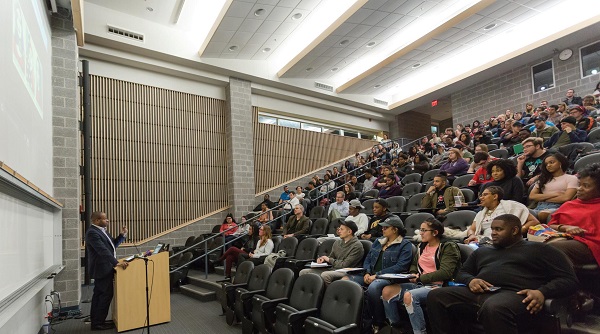

Photo Credit / East Stroudsburg University
By Nia Scott
Staff Writer
This past Wednesday, Dr. James Peterson, the director of Africana Studies and associate professor of English at Lehigh University, came to speak at ESU as our Black History Month Keynote Speaker.
His discussion was titled, “We The People: Corrective Art and Hip Hop Culture in the Era of Trump”.
Who is included in the famous three words “We The People” from the Preamble?
Dr. Peterson spoke about the changing perception of those three words and how art and hip hop are helping to expand our meaning.
He explained to a filled auditorium that the preamble is not used for important civil cases and not used in law.
However, he stated, “The Preambles value is that it sets the table for what the Constitution should mean.”
What he means by that is that while the preamble is not usually used in law, it is interpreted by others as their right to be treated as any American should be treated.
Dr. Peterson then presented the famous images from the Women’s March of three women one black, one wearing a hijab, and the other of Spanish descent.
This is corrective art and is alluding to the preamble by using these images to expand our meaning of “we the people”.
The art is used to show how America has changed to include many more people than it once did.
Next Dr. Peterson began to speak about rap and how that is affecting our meaning of “we the people”.
He used Kendrick Lamar’s song, “Alright” to show through song people are rallying together to protest injustice.
He talked specifically about the Black Lives Matter protests in Cleveland, and that when a young boy was detained by police, instead of resorting to violence, the crowd began singing “Alright”, and it lifted the spirits of everyone there.
Dr. Peterson said that the song, “helped to diffuse the moment in some ways.” The song helped expand the “we” in “we the people” by being inclusive.
He discussed a rap by the group, A Tribe Called Quest, called “We the People…”. Dr. Peterson recited the hook to the song, which is the following:
“All you Black folks, you must go/ All you Mexicans, you must go/ And all you poor folks, you must go/ Muslims and gays, boy, we hate your ways/ So all you
bad folks, you must go”
As Dr. Peterson stated about this song, “This is Q-Tip and A Tribe Called Quest thinking critically about the spirit of the Constitution.”
This is a verse about excluding people and “constricting the we”. The verse is pointing to all of us and asking us to examine ourselves and recognize the prejudices that we have.
Although the Constitution is meant to be inclusive many feel that they are not treated fairly in America.
Dr. Peterson then used the popular show Black Mirror to further his point.
Black Mirror is an episodic show on Netflix where each episode centers around technology in the near future.
One episode in particular called White Bear, is a commentary on how people just take videos of horrible events and act as spectators instead of helping.
The ending of the show makes you feel guilty as Dr. Peterson pointed out, “You feel like there is a construction of ‘we’ that is like a guilty ‘we”’.
The show helps to make us think more about what we’re sharing and how we circulate violent imagery.
It brings us together because most of us are guilty of sharing viral videos and being bystanders.
The first question asked was, “How do you see art changing in the next four years with the presidency of Trump?”
Dr. Peterson predicts that, “you will see an American art renaissance,” meaning that great art will come from this time period either in protest or solidarity.
He thinks that some of that art has already been produced, like the posters from earlier in his presentation.
He also said, “Politics has always been a good motivation for art.”
By 9 p.m., students still had questions for him about his opinions and predictions for the future.
Overall, his discussion on campus was very well received by ESU students.
For those that missed out on the presentation, or who want to hear more from him, Dr. Peterson hosts a podcast called “The Remix” on Philadelphia’s NPR affiliate, WHYY., Also he has a website, www.drjamespeterson.com
Email Nia at:
nscott5@live.esu.edu
